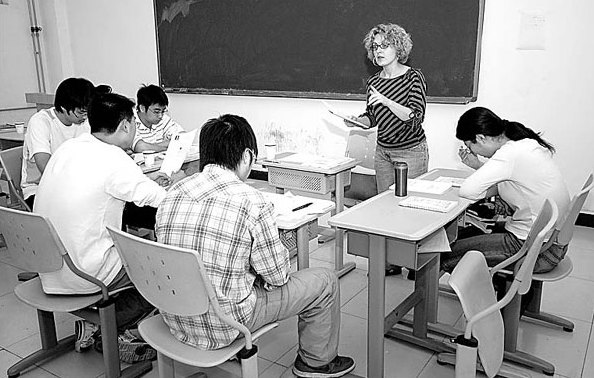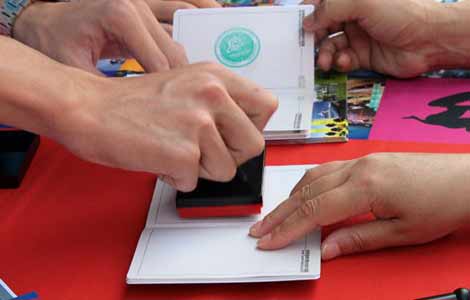A Spanish journey into Chinese language and culture
Updated: 2013-09-21 08:19
By Zheng Jinran in Shijiazhuang (China Daily)
|
|||||||||||
They were subjects she studied in college more than 10 years ago, but for Mari Carmen Espn from Spain, Chinese - both language and culture -is very much a part of her life.
"In the past years, I have accomplished much in both study and work, and I enjoy a comfortable life in China with my husband," she says. "In return, I would like to bring something new to teaching of language education in our two countries, and help more students learn Chinese."
The 38-year-old blonde speaks fluent Chinese now, compared to the days when she first entered university in 1994. Many of her classmates chose to major in European languages, but she chose to study Chinese.
"I knew the language would not be easy to learn, let alone the completely different culture, but I took the challenge."
|
Mari Carmen Espin is a fervent advocate of Chinese language and culture, and she says she wants to promote better exchange between her native Spain and China. Provided to China Daily |
Actually, coming into contact with Chinese culture only spurred her interest and she decided to further her study another two years and got a graduate degree in Universidad Autnoma de Barcelona of Spain, in Barcelona.
As Espin journeyed further into Chinese and its five-thousand-year culture, she became more and more determined to experience real life in China. In 2001, she made the move.
"I wanted to improve my Chinese, especially in speaking and listening, and in learning more about the ancient culture," she says. She had told her boy friend, now her husband, that she would stay only one year, but it was a promise she failed to keep.
After seven years, she coaxed her husband over to China as well, and she next got a job as a French teacher in Shijiazhuang, capital city of Hebei province. Her next move was to the College of International Culture Exchange, Hebei Normal University, a post she has held since 2007.
"Initially, there were many cultural differences that surfaced during teaching, and I didn't know how to interact with the students," she says. Some of her students had laughed at her pronunciation mistakes.
"I was not discouraged, because it meant that they should not be afraid of making the wrong pronunciations, since their teacher made mistakes as well," she says.
Espin is now totally immerse in Chinese traditions, both in work and daily life.
She practices calligraphy because "I can feel the inner peace and long history through the slow tracing of Chinese characters",
Living in China has also caused subtle changes in her.
"I now give presents to my friends and teachers when I visit them, which is usually not the case in Spain where we usually bring flowers, or nothing at all," she says, adding that she did not even notice the changes until her friends pointed them out.
Since 2008, her college has set up a training center for non-Spanish major students, providing them Spanish language training to help them improve their capabilities in furthering studies or finding a job in Spanish-speaking countries.
"More than 20 students have realized their dreams after the training, most of them in medicine or teaching."
As Espin teaches students her native language, she is also aware of her mission in promoting the translations between Spanish and Chinese.
"There is no specific teaching methodology for Chinese language applied in translation for Spanish speakers, so I have tried to find a new platform combining the usual method in Spain with Chinese teaching ways, in the hope of discovering an efficient channel for students like me," she says. Her doctoral thesis was focused on this.
Her thesis was noticed by the Peking University and Beijing Language and Culture University, and even the education counselor of the Spanish embassy in Beijing listened when she defended her thesis in June this year.
"I would like to stay in China longer to learn more aspects of the culture, such as ancient Chinese prose," Espin says.
"But more importantly, I hope to help more Chinese students pursue their dreams in Spain and more Spanish students get to know China and Chinese culture."
Related Stories
Chinese Halal juice products promoted at China-Arab States Expo 2013-09-17 13:41
'Crazy dame' makes Chinese film 2013-09-17 07:26
Creations by Chinese designer presented at London Fashion Week 2013-09-14 11:49
Chinese stars attend Asian Film Summit during 2013 TIFF 2013-09-11 10:59
Something's brewing in the Chinese beer scene 2013-09-10 07:01
Today's Top News
China upgrades warning for super typhoon
Worries linger despite apology on GM rice test
Huawei to create 5,500 new jobs in Europe
Syria details part of chemical arsenal
Starbucks' Internet called safer than Pentagon's
Putin may seek re-election in 2018
Action pledged for new type of Sino-US ties
13 injured in Chicago park shooting
Hot Topics
Lunar probe , China growth forecasts, Emission rules get tougher, China seen through 'colored lens', International board,
Editor's Picks

|

|

|

|

|

|






